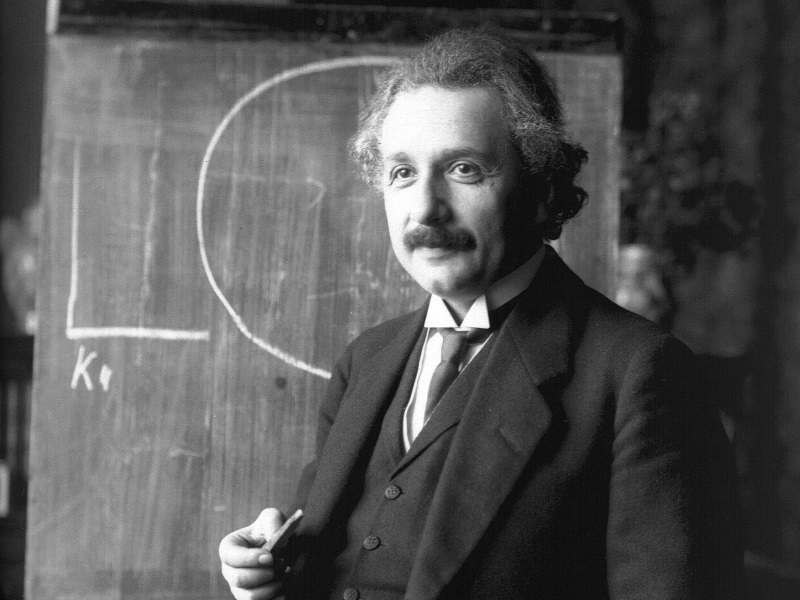- Home
- Science
- Science News
- Einstein's Mass Energy Equation Inadequate, Claims Indian Researcher
Einstein's Mass-Energy Equation Inadequate, Claims Indian Researcher

Einstein considered just two light waves of equal energy emitted in opposite directions with uniform relative velocity, Ajay Sharma, a Shimla-based researcher who challenged Albert Einstein's derivation mass-energy equation, said on Sunday.
The equation was given by Einstein in 1905.
His technical paper "The mathematical derivation or speculation of E=mc^2, in Einstein's September 1905 paper, and some peculiar experiments" was published by Bauman Moscow State Technical University in Moscow last month.
E=mc^2 means energy is equal to mass multiplied by the speed of light squared.
Sharma, an assistant director for education with the Himachal Pradesh government, told IANS that Einstein's theory has not been studied completely.
"It's only valid under special conditions of the parameters involved, e.g. number of light waves, magnitude of light energy, angles at which waves are emitted and relative velocity," he said.
Einstein considered just two light waves of equal energy, emitted in opposite directions and the relative velocity uniform. There are numerous possibilities for the parameters which were not considered in Einstein's 1905 derivation, said Sharma's paper.
This equation expresses the fact that mass and energy are the same physical entity and can be changed into each other, the paper said.
It said E=mc^2 is obtained from Lmc2 by simply replacing L by E (all energy) without derivation by Einstein. "It's illogical," he said.
The paper said Fadner correctly pointed out that Einstein did not mention E in the derivation.
Sharma's book, 'Beyond Einstein and E=mc^2' published by the Cambridge International Science Publishers, says Einstein was not the original propounder of the theory of relativity -- rather he took work from existing literature and published it in 1905 in German journal 'Annalen de Physik'.
"Many people will be surprised that Einstein's work was not peer reviewed before publication. The first postulate of relativity was given by Galileo in 1632 in his book 'Dialogue Concerning the Two Chief World Systems'," the 51-year-old Sharma said.
According to him, Einstein took this opportunity to publish the work of Galileo (1632, Principle of Relativity), Poincare (1898, Constancy of Velocity of Light), Lorentz (1892, Variation of Mass etc), Larmer (1897, Time Dilation), and Fitzegerald (1889, Length Contraction) in his own name.
Although Einstein's theory is well established, it has to be critically analysed and the new results would definitely emerge, a beaming Sharma added.
For the latest tech news and reviews, follow Gadgets 360 on X, Facebook, WhatsApp, Threads and Google News. For the latest videos on gadgets and tech, subscribe to our YouTube channel. If you want to know everything about top influencers, follow our in-house Who'sThat360 on Instagram and YouTube.
- Galaxy S24 Series
- MWC 2024
- Apple Vision Pro
- Oneplus 12
- iPhone 14
- Apple iPhone 15
- OnePlus Nord CE 3 Lite 5G
- iPhone 13
- Xiaomi 14 Pro
- Oppo Find N3
- Tecno Spark Go (2023)
- Realme V30
- Best Phones Under 25000
- Samsung Galaxy S24 Series
- Cryptocurrency
- iQoo 12
- Samsung Galaxy S24 Ultra
- Giottus
- Samsung Galaxy Z Flip 5
- Apple 'Scary Fast'
- Housefull 5
- GoPro Hero 12 Black Review
- Invincible Season 2
- JioGlass
- HD Ready TV
- Laptop Under 50000
- Smartwatch Under 10000
- Latest Mobile Phones
- Compare Phones
- Huawei Pura 70 Pro+
- Huawei Pura 70 Ultra
- Tecno Camon 30 Premier 5G
- Motorola Edge 50 Fusion
- Oppo A1i
- Oppo A1s
- Motorola Edge 50 Ultra
- Leica Leitz Phone 3
- Asus ZenBook Duo 2024 (UX8406)
- Dell Inspiron 14 Plus
- Realme Pad 2 Wi-Fi
- Redmi Pad Pro
- Cult Shock X
- Fire-Boltt Oracle
- Samsung Samsung Neo QLED 8K Smart TV QN800D
- Samsung Neo QLED 4K Smart TV (QN90D)
- Sony PlayStation 5 Slim Digital Edition
- Sony PlayStation 5 Slim
- Godrej 2 Ton 3 Star Inverter Split AC (SIC 24ITC3-WWA)
- IFB 1 Ton 2 Star Inverter Split AC (CI1322C113G1)












